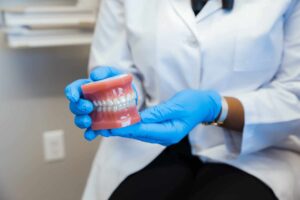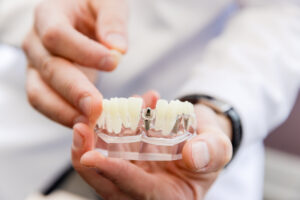Your journey to revitalizing your smile begins with a consultation with one of our friendly and highly-skilled Fairfax dentists. This initial consultation offers the opportunity to ask questions and to develop a treatment plan that addresses your specific needs.
dental implants in fairfax, VA
Restore Your Smile & Function with Dental Implants
Missing teeth can make it challenging to chew food properly, affect speech clarity, and leave you feeling self-conscious about the gaps in your smile.
Dental implants offer a natural-looking solution that not only preserves the jawbone but also promotes healthy bone growth, maintains the stability and function of your teeth, and provides improved function and security. With dental implants, you can expect to have a comfortable and natural-feeling replacement for your missing teeth that enhances your overall appearance and well-being.
Our dental implants in Fairfax are considered the gold standard in the realm of missing teeth replacement. This procedure involves the insertion of a titanium post into the jawbone, which is then restored with a natural-looking tooth that functions both cosmetically and naturally.
Issues Dental Implants Can Address
Dental implants offer a durable and effective solution for a variety of dental issues, acting as a replacement for missing teeth. They provide a foundation for both permanent and removable replacement teeth that are made to match your natural teeth. Here are some of the issues our Fairfax dental implants can address:
- Missing Teeth: The most obvious and common use for dental implants is to replace one or more missing teeth without affecting adjacent teeth, restoring both function and aesthetics.
- Tooth Decay: When a tooth is severely decayed and cannot be saved, dental implants can serve as a replacement option after the decayed tooth is extracted.
- Periodontal Disease (Gum Disease): Advanced gum disease can lead to tooth loss. Dental implants can replace these lost teeth, provided the gum and bone health are restored and maintained.
- Injury or Trauma: Accidents can lead to tooth loss. Implants provide a permanent solution to replace teeth lost due to injury or trauma.
- Bone Loss Prevention: When you lose teeth, you also tend to lose bone mass in your jaw. Dental implants can stimulate and maintain jaw bone, preventing bone loss and supporting facial structure.
- Difficulty Eating or Chewing: Missing teeth or ill-fitting dentures can make chewing difficult, affecting your ability to eat certain foods. Implants function like natural teeth and can significantly improve chewing efficiency.
- Speech Issues: Missing teeth can impair speech. By replacing missing teeth, dental implants can help improve speech and eliminate any lisping or difficulty pronouncing certain words.
- Denture Stability: For those who wear removable dentures, implants can provide an anchor that significantly improves the stability and comfort of these appliances, reducing slipping and movement.
- Aesthetic Concerns: Beyond functionality, dental implants also provide a cosmetic solution. They look and feel like natural teeth and can help restore a patient’s smile and confidence.
- Facial Sagging and Premature Aging: Missing teeth can lead to a sunken appearance and premature aging. Implants help maintain the natural shape of your face and smile.
Components of a Single Dental Implant
Our implants mimic the natural bone structure of the tooth.
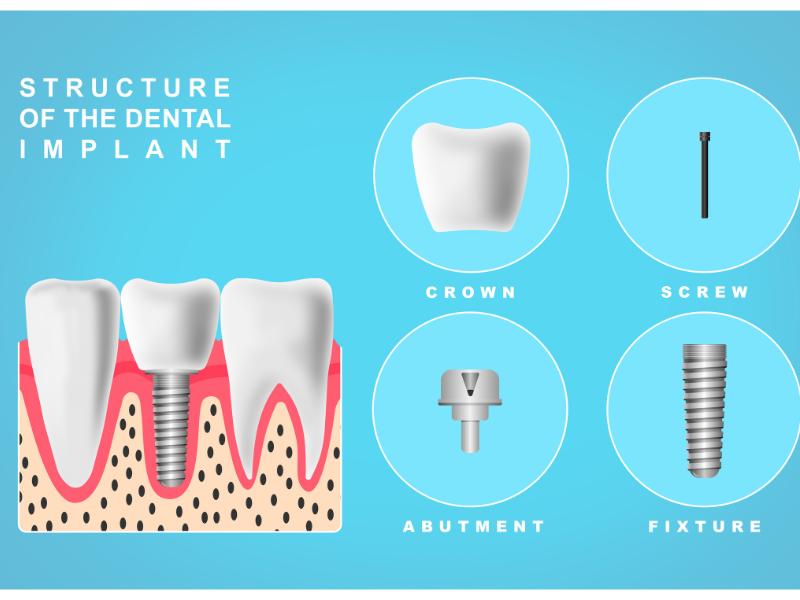
Fixture
The fixture – or post – is like a screw and is made of titanium, a very strong and safe metal. We put this post into your jawbone where the missing tooth’s root used to be. Over time, your bone grows around this screw, making it very stable, just like the roots of your natural teeth.
Abutment
Think of this as a connector piece. Once the post is firmly attached to your bone, we put this abutment on top of it. It’s acts as a platform where we will place the new prosthetic tooth.
Implant Crown
This is the part of the implant that looks like a real tooth. It’s made to match your other teeth in color and shape, and it sits on top of the abutment. This is the only part you and everyone else can see, and it’s what you use to chew your food.
Bridge
An implant-supported bridge is composed of 2 single-unit dental implants, spaced apart to restore 3 or more teeth to blend into your dentition.
How Dental Implants Work
Once a tooth is extracted and a bone graft has been placed in the affected area to ensure proper healing, the stage is set for the placement of a dental implant.
The implant fixture is carefully positioned within the jawbone, allowing it to fuse with the surrounding bone and heal properly. This integration process typically takes between 3 to 4 months.
We believe the top benefit implants offer patients is their impact on health. Since the implant consists of a post that embeds into the jawbone, it simulates the advantage of a natural tooth root. In addition to serving as a stable foundation for a tooth, a tooth root serves as a healthy stimulant for the jawbone. By using an artificial implant post, the jawbone is enabled to grow stronger and resist deterioration.
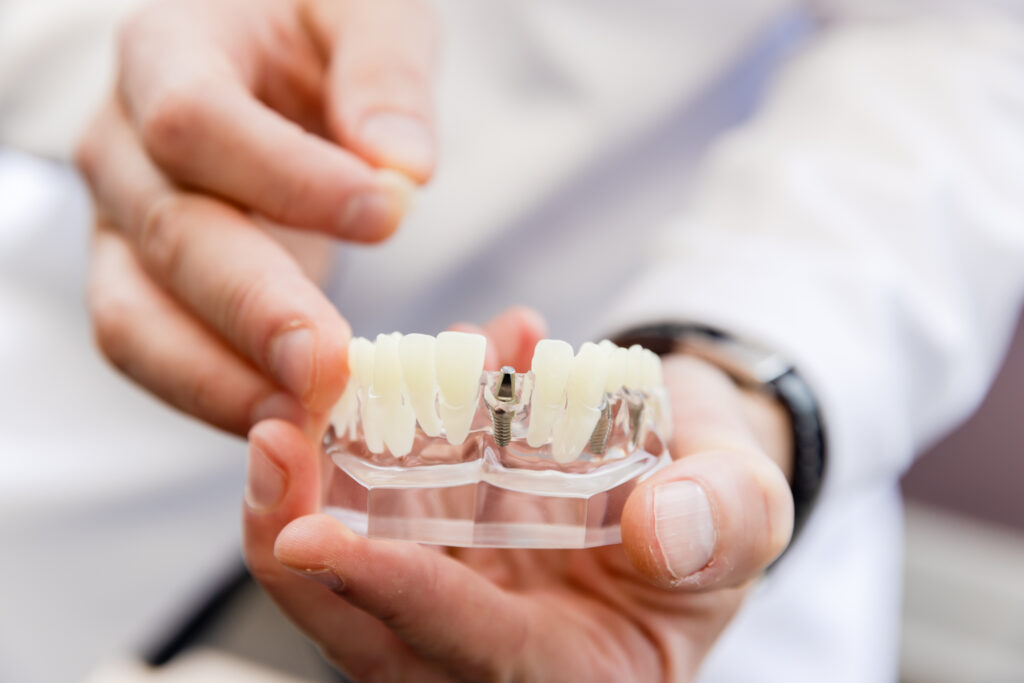
The Process of Getting Dental Implants in Fairfax, VA
If we discover any pre-existing conditions, we will need to address these before we can move on to restoring teeth. Problems like gum disease, poor bone density, untreated injuries, or severely decayed teeth are all easily treatable. This step is crucial to ensuring your mouth is in the best condition prior to placement surgery.
Getting a dental implant is a carefully executed and well-planned process to ensure you’re comfortable and achieve the best results. First, one of our dentists makes sure the area is completely numb, so you won’t feel any pain, just a bit of pressure. Then, they gently prepare your jawbone and insert a small, strong post that acts like the root of your new tooth. After the post is in place, your body naturally works with it, creating a strong foundation for your new tooth.
Depending on your case, you can discuss getting a temporary crown or bridge while you wait for osseointegration.
After having enough time to integrate with the supporting bone structure, the implant post should be stable enough to place an abutment. An abutment acts as the connecting piece between the implant post and dental crown, connecting the entire appliance together.
After the dental implant has fused with your jawbone, it’s time for the final step: placing the permanent crown or bridge, also known as the tooth restoration phase. Here’s how it typically unfolds:
- Custom Design: Your dentist will make sure the implant is firmly integrated with your jawbone. Then, we’ll take digital scans of your mouth to ensure the new tooth/teeth are designed to fit perfectly in your mouth, matching the shape, size, and color of your natural teeth.
- Crafting Your New Tooth: Using the impressions or scans, a dental lab crafts your new tooth or teeth. This is a meticulous process to ensure that your new tooth not only fits perfectly but also looks natural and blends seamlessly with your surrounding teeth.
- Fitting the Crown or Bridge: Once the crown or bridge is ready, we’ll carefully attach the new tooth to the abutment. We’ll also make any necessary adjustments to ensure a comfortable bite and a natural appearance.
This phase concludes the implant process, leaving you with a strong, durable, and visually appealing replacement tooth that functions just like your natural ones.
What to Expect
To ensure that the full process runs smoothly, a patient must follow a certain protocol on their journey to receive dental implants.
The procedure typically involves 5 to 7 visits, which include fixture placement, healing checks, and scans to ensure a successful final restoration.
After the implant has fully healed, it is uncovered, and a digital scan is taken to create a custom-made abutment and crown at a lab. This abutment and crown will function as a permanent tooth, providing optimal function and aesthetics.
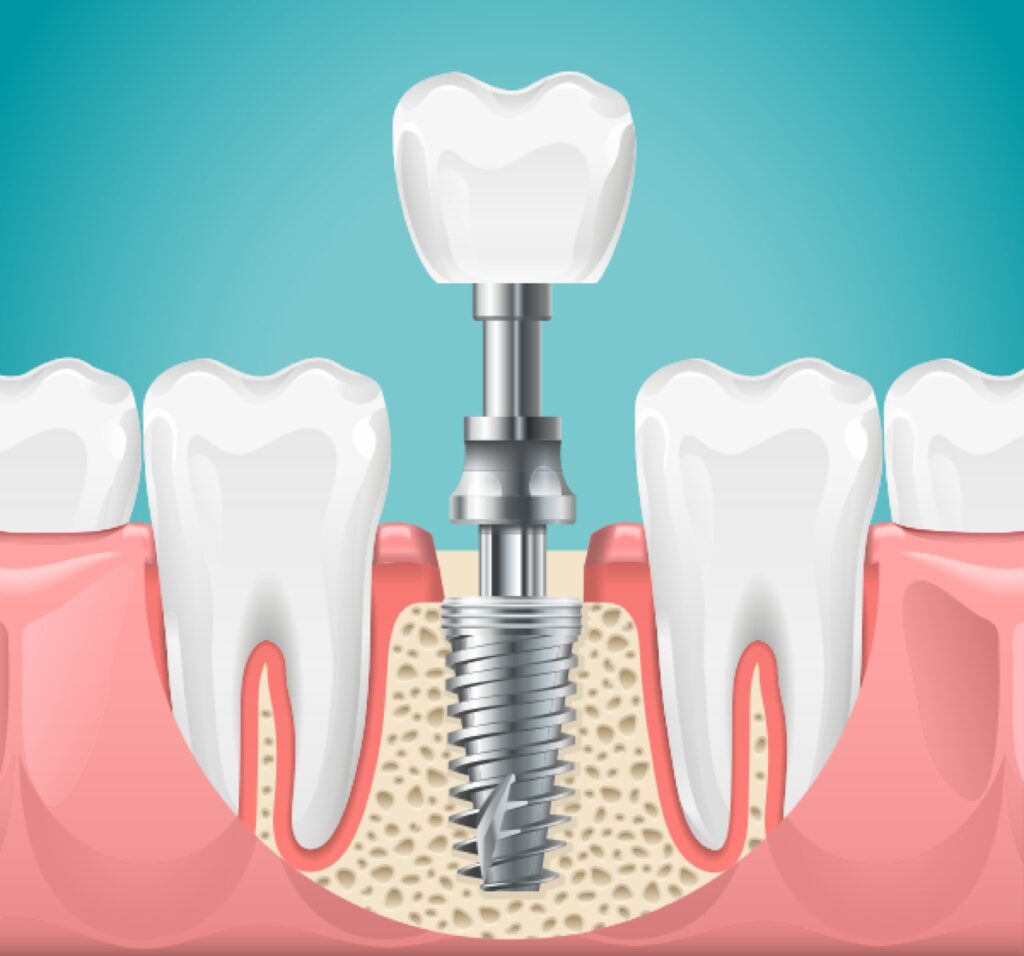
Why Get Dental Implants in Fairfax?
Dental implants offer numerous advantages over other restorative options.
Natural Appearance
Dental implants not only look aesthetically pleasing, but they also function exceptionally well, especially in situations where the tooth structure that would normally support a crown is inadequate or absent.
Long-Lasting
Dental implants are renowned for their longevity and can last for an extended period, potentially even permanently. In situations where the dental implant crown requires replacement, the dental post remains intact, providing a solid foundation for a new crown.
The Closest Thing to Real Teeth
Dental implants are considered the gold standard in tooth replacement, as they restore natural function and aesthetics to your smile.
Frequently Asked Questions
The most significant amount of time in the dental implant process is attributed to the bone healing cycle and the integration of the implant, which usually takes around 3 to 4 months to complete.
Absolutely! Implants can be utilized to anchor and stabilize dentures, providing an excellent option for those who wear removable appliances.
To determine the suitability for dental implants, an initial assessment of your jaw bone is necessary, which is typically performed using a 3D cone beam scan. The amount of bone available, as well as your oral and gum health, will be taken into consideration to determine the feasibility of the implant procedure.
The cost of a full implant procedure varies based on a multitude of different factors; this may include the type of implant chosen, the number of teeth missing, or your need for preliminary treatment. While it’s not possible for us to provide a true estimate of the expense due to these factors, you may be able to receive more information upon attending a consultation with our dentists.
Cleaning your dental implants and prosthetic teeth is key to ensuring their longevity and maintaining your overall oral health. Here’s how you can take care of them:
- Brush Twice Daily: Use a soft-bristled toothbrush to gently brush around and under the implant crown or bridge. Special brushes designed for implants, like interdental brushes, can help you clean those hard-to-reach areas without damaging the implant.
- Floss Daily: Use unwaxed floss or floss designed specifically for dental implants to clean around the abutments and under the prosthetic teeth. A floss threader can help you get the floss under the prosthetics for a more thorough clean.
- Consider Water Flossers: Water flossers are a great addition to your oral hygiene routine, especially for cleaning around implants. They can help remove plaque and food particles without putting too much pressure on the implant.
- Use Non-abrasive Toothpaste: Some toothpastes contain abrasive ingredients that can scratch the surface of your prosthetic teeth, making them more susceptible to staining. Look for a toothpaste that’s specifically labeled as non-abrasive and safe for use with dental implants.
- Avoid Smoking and Chewing Tobacco: These habits can interfere with the healing of your implants and negatively affect the health of your gums and bone around the implant.
- Regular Dental Check-ups: Visit your Fairfax dentist at Oakton Family Dentistry regularly for cleanings and check-ups. They can professionally clean your implants and prosthetics, check for any issues, and provide guidance tailored to your oral health needs.
- Limit Staining Foods and Beverages: Just like with natural teeth, certain foods and beverages can stain your prosthetic teeth. Limit coffee, tea, red wine, and other staining substances to keep your smile bright.
Remember, taking care of your dental implants and prosthetic teeth is very similar to caring for your natural teeth, focusing on gentle cleaning and regular maintenance to avoid complications and ensure their durability.
- Fixed Bridges: A fixed bridge fills the gap left by missing teeth by anchoring to the natural teeth on either side of the space. These anchor teeth are prepared (shaped) to hold the bridge in place. While bridges are a durable solution, they require the alteration of adjacent healthy teeth.
- Removable Partial Dentures: Partial dentures are designed to be taken out and cleaned daily. They can replace one or more missing teeth and are less invasive than implants. Metal or plastic clasps hook onto adjacent natural teeth to secure the denture.
- Full Dentures: When most or all of the teeth are missing, full dentures can replace the entire upper or lower set of teeth. They rest on the gums and can be removed for cleaning. While less costly upfront, they may require adjustments or replacements over time due to changes in the jawbone and gums.
- Orthodontic Treatment: In cases where missing teeth have caused the remaining teeth to shift, orthodontic treatment like braces or clear braces might be used to realign the teeth and close gaps. This solution might be combined with other restorative options for optimal aesthetics and function.
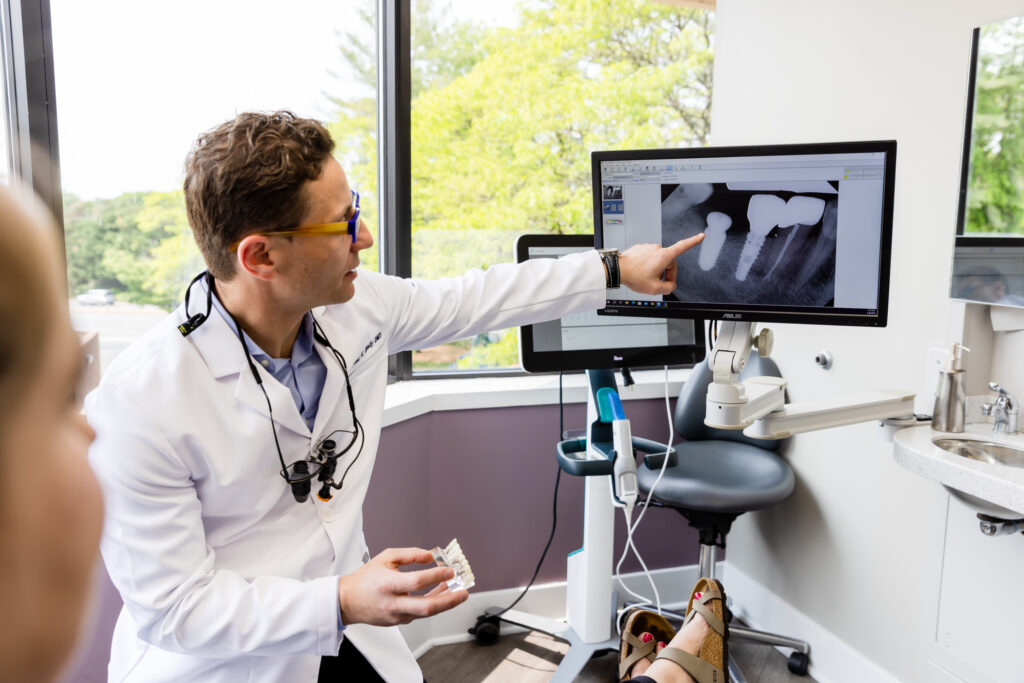
Restore Your Smile With Dental Implants in Fairfax, VA
We restore smiles back to optimal health every day at Oakton Family Dentistry! Give us a call to discuss your tooth replacement options with one of our dentists.



